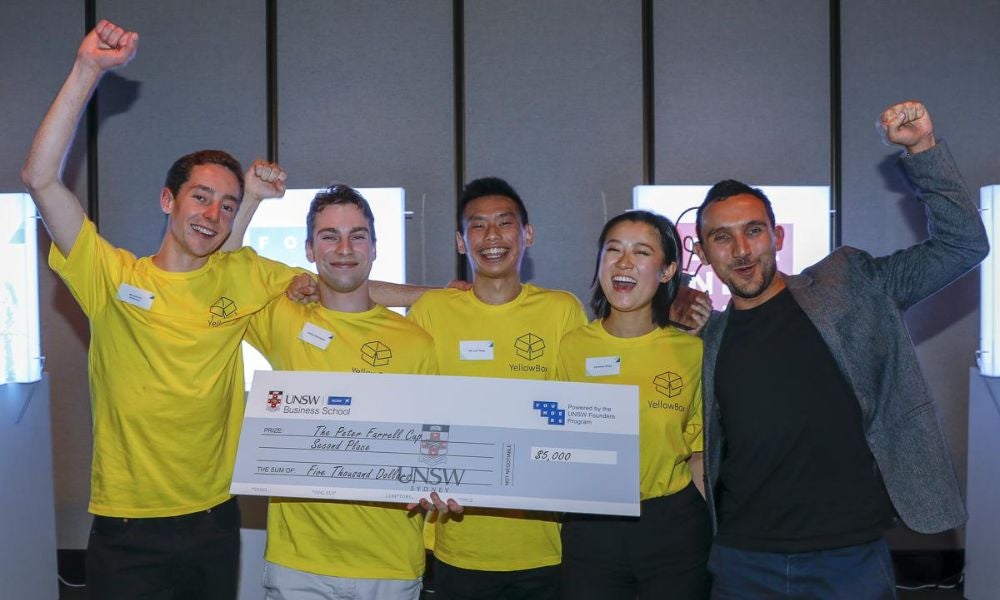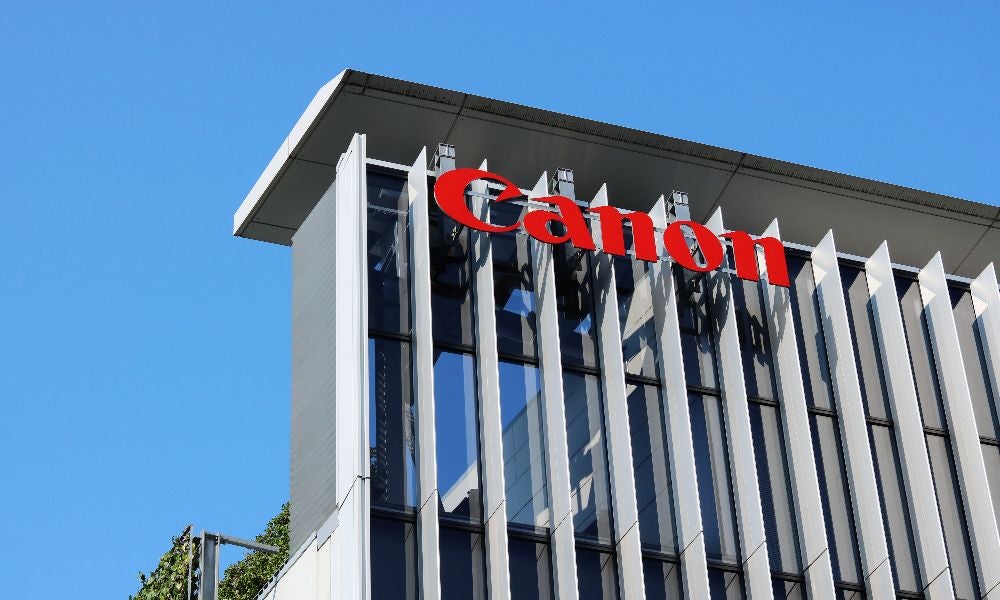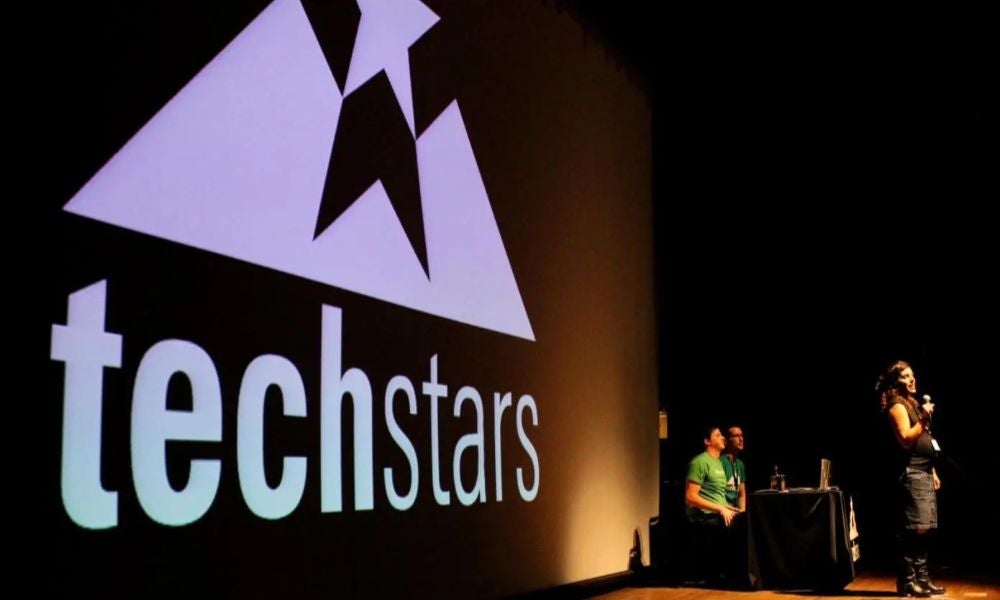Vanessa Zhao on entrepreneurship and Yellowbox's startup success
Yellowbox co-founder Vanessa Zhao says the future of work hinges on hybrid working technology that drives sustainability and wellbeing in modern workplaces
When Vanessa Zhao finished her Bachelor's Degree in Commerce at UNSW Business School in 2018, she didn’t imagine she would soon be at the forefront of workplace technology in just a few years. Alongside fellow UNSW graduates Adrian Brossard, Ho Jun Tang, and Ben Delaney, Zhao turned a classroom idea into Yellowbox Smart Lockers, a network of smart lockers that people can hire on demand using an app, which they co-founded in 2019. Six years later, Yellowbox is a global workplace technology company reshaping how organisations approach storage and flexible work.
Backed by the UNSW Founders program, the team built a mobile app and Bluetooth-enabled lockers that have since been adopted across real estate, corporate offices, and wellness-focused spaces, prioritising hybrid working, sustainability, and workers’ wellbeing. Through global partnerships like Canon and other major Fortune 500 companies across the Asia-Pacific region, Yellowbox has become more than a storage solution – a startup and product that represents flexibility, wellbeing, and the future of how people work.
Every startup needs support
When Ms Zhao enrolled at UNSW Sydney in 2016, she had no clear plan for her career. “I was just curious to learn about business. That’s why I chose that degree, because I didn’t have a really clear direction within the business world of what I wanted to do,” she said. “I just knew that, from my family all being quite entrepreneurial, that I wanted to learn a bit more about that field.”
In her final year, Ms Zhao discovered user experience (UX) design through a tutor’s advice. “I went to him and said, ‘Look, these are my interests. I enjoy being creative, but I’m also drawn to the business side of things. What direction could you point me in?’ From there, he introduced me to a field that was still quite new at the time, called user experience design. Back then, UX design wasn’t something many people had even heard of.”

Inspired, she enrolled in a UX bootcamp at General Assembly. For one assignment, she had to “come up with any business idea” to practice her skills – and that idea became the seed for Yellowbox. “So I came up with the idea, made the wireframes, came up with the name and logo, and after that course finished, it was just uncanny timing. Basically, right as that was completed, I walked past and saw a poster of the Peter Farrell Cup on campus. I entered the Peter Farrell Cup with three of my friends from uni, and we pitched the idea.”
With three co-founders – all fellow UNSW Sydney students – Ms Zhao entered the competition. To their surprise, they came second. “We won $5000 from that competition, and we still have the cheque up in the office. That funding helped us kickstart our MVP product development. It was enough for us to say, ‘Okay, let’s properly commit to this and make it a thing.’ The competition also created a solid team of founders, who I still work with every day. I love what I do.”
Building in the margins
Despite the founding team’s early success, they initially kept their startup as a side hustle. “Right after the Peter Farrell Cup, we all went into our corporate careers. Each of us did a one-year stint – I was at Qantas as a grad – but we kept meeting up after work at uni to keep building this,” she said.
The turning point came when the team applied for the UNSW 10x Accelerator. “We applied for that, thinking that we were actually too early. But thankfully, they took us, and that was really where we probably grew to be honest… The program forced us to launch by a certain date and just get that feedback. And that honestly saved us so many months, or maybe even years of time,” explained Ms Zhao.
Learn more: How investors and entrepreneurs can successfully play the forecasting game
Throughout this period, she acknowledged that mentorship was critical. “We felt like we had a strong vision, but we didn’t know how to get there. And we felt a little bit like everything was new, like every single thing no one had taught us how to do," she said. “So having the mentors put some guardrails, put some structures and some guidance, like it was so, so necessary, and it’s been the combination of our different mentors that’s really allowed us to define how we now make decisions independently.”
A successful pandemic pivot
Like many startups, Yellowbox faced its toughest test during COVID-19, which struck in its very first year of operations. At the time, the company focused on public smart locker systems at beaches, gyms, and transport hubs. “We were very focused on the public network. So our smart locker system, it’s like, that’s what we do, but we always applied it to public arenas," explained Ms Zhao. "We were spreading ourselves very, very thin in terms of what our core business model was.”
When lockdowns closed those venues, their business model collapsed overnight. “All of these public venues closed, and we really had to think, 'Okay, how are we actually going to do this in terms of a proper, serious business model?' And so now we are very focused."

The breakthrough came from listening to a client. “Randwick City Council was our first serious client, and they said, ‘You know what, where we really need this is in our office.’ They suggested paying us a SaaS fee instead, and that’s now exactly what we do. By listening to the market and our clients, we found our model,” she said.
Today, Yellowbox focuses exclusively on hybrid workplaces and Fortune 500 companies, delivering its smart locker solutions through a SaaS model. This strategy has proven highly effective, and the company has doubled its revenue every year for the past five years. “They pay upfront for our locks, and then we charge them the SaaS fee every month. So that’s what’s afforded our business to become much more scalable and stable at the same time.”
Going global
Even before the pivot, Ms Zhao had already taken another risk: international growth and expansion. Through a chance meeting at the Sydney Startup Hub, Yellowbox was accepted into the TechStars accelerator in the Netherlands, which led Vanessa to relocate to Europe to grow the business.
“That was a big risk at that time, because we were very young, like we still hadn’t matured too much to be thinking about international expansion, but we decided that we needed to," said Ms Zhao. "It was all European-led companies, and so dedicating me as a founder (or like a quarter of our resources at that time) to be overseas in a different time zone was a big risk.”
Subscribe to BusinessThink for the latest research, analysis and insights from UNSW Business School
Ms Zhao moved to the Netherlands alone as the sole representative for her team and stayed in Europe for four years, helping Yellowbox grow across the continent. “It was difficult working basically by myself for a long time there. We headed where all of our competitors were, basically. So it was a really, like intense market to be in, but it pushed us to develop our product faster and better.”
Looking back, she said it was one of the most pivotal moments of her career and for the success of Yellowbox. “The Australian market is too small, and we needed to be there in order for us to be informed about where the market is going,” she added.
Lessons in leadership
For Ms Zhao, the pandemic-era pivot and moving overseas alone to work on her company was also a personal leadership test. “I’ve learned how to direct my team, With our sales team now, I’m quite strict on like telling them, this is the core business of the company, which is selling to workplaces. And we have to keep really strict to that, and be really clear with the reasons why.”
Culture, too, has become a priority as the team grows. “Culture is not something that we had intentionally thought about until the past year or two, just because we were so lean," she said. "Now we’ve finally got enough of the team that we have been quite intentional about it. In the last year, it’s been top of mind for us, the co-founders.”

Their approach is hands-on. “We had our strategy weeks, which is like the first week of every year, and we worked together with our staff last year to come up with our company mission statement and values.”
Unlike many high-growth startups, Yellowbox has deliberately avoided seeking funding through venture capital and instead reinvests its profits back into the company. “We’re not VC-backed, and we’ve decided not to be. We’ve grown completely off of our own profit, and that takes longer, but it’s made the experience much more enjoyable.”
Advice for the next generation of leaders
Yellowbox is in a growth phase, expanding across the UK, India, Singapore, and soon the US. The company has grown from fewer than 10 people last year to around 20 employees today, and is now integrating AI to automate locker management as part of the wider shift toward smart building technologies. “We are disruptors in the market. Our mission is to create new workplace technology and push the boundaries of what’s possible,” she said.
Reflecting on her journey, Ms Zhao was quick to highlight the importance of mentors, persistence, and fun. “It’s important not to let the no’s – and we definitely had our fair share of rejections, and really it was a difficult ride to get to product market fit. So, not to take things to heart, I think it's important if you’re just starting out.”
The key to this is patience, she said: “Just be more patient and enjoy the journey along the way. It takes longer than you would expect, but it’s very worth it.”
Learn more: Why passionate entrepreneurs fail: The missing success factor
Equally, she believes in the value of enjoying the process with the right people. “Honestly, it was just so fun. I know that sounds like pretty typical advice, but you really do have to be careful about the co-founders you choose. Beyond that, I think it’s just as important to actually like your co-founders as friends. We genuinely enjoyed spending time together while working on a challenge.”
She encourages young entrepreneurs to take things step by step, rather than getting lost in the big picture. “In every moment, I just focused on the next step. If I had looked too far ahead from the beginning, I might not have even started. “Taking it one step at a time, and being patient, that’s really the key.”
